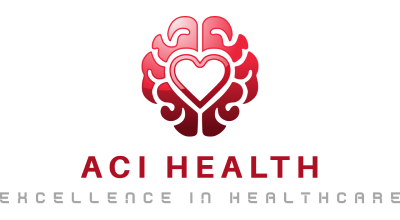
Values of Joint Commission Accreditation (JCA)
ACI Health’s Joint Commission Accreditation (JCA), awarded by The Joint Commission (TJC), is a significant recognition for healthcare organizations that meet specific performance standards in quality and safety. Here are several key aspects highlighting the importance of JCA.

Enhanced Quality of Care
- Standardized Practices: JCA promotes the adoption of best practices and evidence-based standards that enhance the overall quality of patient care across healthcare facilities.
- Performance Improvement: Organizations undergoing accreditation must continuously assess and improve their performance, leading to better patient outcomes and satisfaction.
Patient Safety
- Focus on Safety Measures: The accreditation process prioritizes patient safety by evaluating various safety protocols, risk management practices, and infection control measures.
- Reduction in Errors: Compliance with JCA standards helps reduce medical errors, adverse events, and patient harm, fostering a culture of safety within healthcare settings.
Regulatory Compliance
- Alignment with Federal and State Regulations: Achieving JCA adherence helps organizations comply with various federal and state regulations, which can prevent legal issues and promote stability.
- Deemed Status: Accreditation provides deemed status for Medicare and Medicaid participation, streamlining the compliance process and avoiding additional inspections.
Improved Financial Performance
- Increased Reimbursement Rates: Many insurers and government programs offer higher reimbursement rates to accredited facilities due to their commitment to quality and safety.
- Attracting Patients: Accreditation can enhance an organization’s reputation, encouraging more patients to choose their services, thereby increasing revenue.
Organizational Performance and Efficiency
- Operational Standards: JCA requires healthcare organizations to standardize their operations, leading to improved efficiency, reduced waste, and better resource management.
- Teamwork and Collaboration: The process encourages collaboration among staff, promoting interdisciplinary teamwork that enhances service delivery.
Patient and Family Engagement
- Emphasis on Patient-Centered Care: Accreditation emphasizes the importance of engaging patients and their families in care planning, decision-making, and education.
- Enhanced Patient Experience: JCA encourages organizations to consider patient feedback, leading to an improved overall experience.


Credibility and Trust
- Trusted Recognition: JCA accreditation serves as a mark of excellence and credibility, assuring patients, families, and the community of the organization’s quality and safety.
- Competitive Advantage: Accredited facilities can differentiate themselves in the marketplace, gaining a competitive edge over non-accredited organizations.
Continuous Improvement Culture
- Commitment to Ongoing Evaluation: The accreditation process fosters a culture of continuous improvement, motivating organizations to continually assess and enhance their performance.
- Regular Reassessment: Organizations undergo regular surveys and evaluations, ensuring that they maintain high standards over time.
Access to Resources and Support
- Educational Resources: The Joint Commission provides various resources, tools, and guidance to help organizations improve their quality and safety standards.
- Networking Opportunities: Accredited organizations gain access to a network of other accredited facilities for sharing best practices and learning opportunities.
